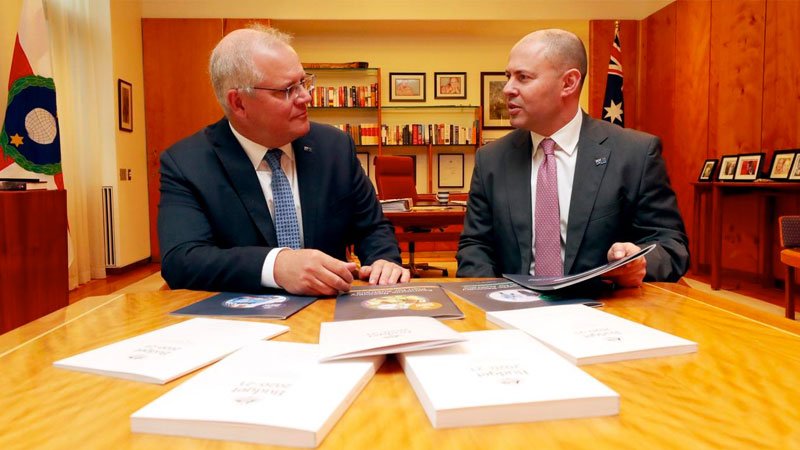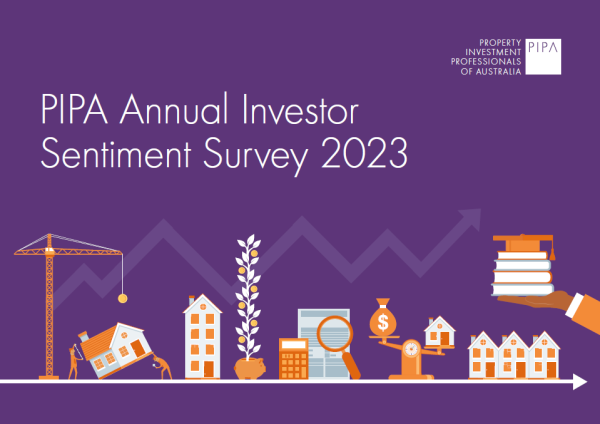Federal Budget 2020: The Property Industry Weighs In
Oct 2020Karen Millers
Categories
Location ReportsMedia releasesNational market updatesPersonal advisersPIPA AdviserPIPA Annual Investor Sentiment SurveysPIPA Member ProfilesPIPA video updatesPIPA webinarsPodcastsProperty advisersProperty newsLatest Articles
PIPA Member Profile | Amanda Turner, Opulence Property
The federal government has rolled out its recession-battling budget, a single-year plan centring on tax cuts, spending, support for businesses and jobs that will rely heavily on a private sector-led recovery.
In an attempt to drag the economy out of its first recession for 30 years, the federal government has announced a raft of new measures, including asset write-offs and tax offsets for Australian businesses, while also providing some relief for the construction industry.
The extension of the First Home Loan Deposit scheme, which enables first-home buyers to get into the market with a deposit as low as 5 per cent while avoiding lenders’ mortgage insurance, was one of the few property-related items in this year’s budget.
Other measures included additional $1 billion of low-cost finance to support the construction of affordable housing for those at risk of homelessness in the wake of the pandemic, provided via the National Housing Finance and Investment Corporation.
An investment of $150 million for the Indigenous Home Ownership Program, for Indigenous Business Australia to deliver upwards of 360 home loans for new housing construction in regional Australia was also put forward.
Despite industry fears of ongoing job losses in the construction industry, hope for a social housing-led economy recovery was dashed and there was no extension to the $680 million Home Builder scheme due to expire in December.


Eliza Owen
Head of Research
Corelogic
“While the budget may have seemed a bit ‘light on’ in terms of direct stimulus and initiatives for the private sector housing market, there have been many instrumental institutional interventions since the onset of Covid-19, including reduced interest rates by the RBA, which may go further down in the coming months, and mortgage repayment deferrals from APRA, which have already been extended through to March next year.
“Having said that, data suggests when you only provide the incentive for new home builds, it does count towards construction.
“Since the announcement of Home Builder for example, Corelogic has seen a steady increase in the number of valuations being ordered across our platforms for construction loans.
“These orders are up 53 per cent in the past 28 days, compared with the 28 days leading up to June 4 when Home Builder was announced.
“So I imagine this particular extension to the First Home Loan Deposit Scheme will also bring construction of new homes forward.”

Mark Steinert
Chief Executive
Stockland
“With very low levels of population growth it is more likely that new construction will reduce rather than grow, particularly in apartments, which has been affected by the reduction in foreign students and the reduction in skilled migration.
“To get that kind of growth there will probably need to be an extension of Home Builder. That has been a really positive scheme.
“The Home Builder extension is really going to be critical if you want to get growth in housing in that period with low population growth.”

Bradley Speers
Head of Research, Australia
CBRE
“Most of the budget’s benefits to the real estate sector come indirectly through support to the broader economy—boosting jobs, stimulating business investment and providing households with more money to spend.
“The First Home Owner Grant has proven popular this year and has contributed to first home buyers returning to the market while lower interest rates have also assisted.
“Further support on both fronts will help stabilise dwelling prices— particularly in Sydney and Melbourne—and avert sharp price falls.”

Andres Reith
National Leader
Real Estate and Construction
BDO Australia
“Overall, it’s pleasing to see the government recognising the importance of the construction sector for the Australian economy.
“The announcement to extend the First Home Loan Deposit Scheme is in addition to the $680 million Home Builder scheme announced in June which also supports the residential construction sector.
“This is clearly a move to maximise the impact of the budget announcement on the residential construction sector by requiring new builds.”

Stuart Penklis
Head of Residential
Mirvac
“We welcome the ongoing incentive that encourages first home buyers into the market.
“This will provide more confidence for first time buyers and the scheme complements the existing first home owners grants.”

Jon Davies
Chief Executive
Australian Constructions Association
“Through increased collaboration, we can de-risk projects through job creating advance works, ensure that there is sufficient capability, capacity and skills within both government and industry to undertake the work, and fully leverage the social and economic benefits of this investment.
“Ultimately this approach will deliver more projects, boost economic recovery and create thousands of jobs for the same investment
“Given what is at stake, we call on the federal government to take a more active role in driving the reforms needed to develop a more sustainable and productive construction industry.”

Richard Gibbs
Director
Urbis
“The federal government has signalled that this is still a market-based economy and left to its own devices the market doesn’t have the capacity at the moment due to the shock from Covid-19.
“Through the budget, the government has indicated that not only is it going to continue to fund the banks but it is also prepared to provide the investment funds for businesses in Australia.
“There is still a high level of uncertainty, but through their stewardship over the economy the federal government has set a good foundation for a recovery.
“For the construction sector it will still see an uneven pattern of activity, part of which will be determined by behaviour trends in relation to the population and how things open up with net-interstate migration.”

Simon Basheer
National President
UDIA
“The budget sensibly recognises this is no time for business-as-usual policy settings, and instead takes an aggressive approach to the nation’s economic rejuvenation.
“Research commissioned by UDIA shows the fall in net overseas migration will result in an average per annum reduction of approximately 50,000 homes per year for the next 5 years.
“Efforts to tap domestic demand and keep jobs flowing across the housing construction sector will be essential to maintaining economic momentum until net overseas migration returns to more sustainable levels.
“Likewise, the creation of more affordable housing underpinned by an expanded bond scheme will help boost the diversity of stock needed across our cities.”

Michael Fotheringham
Executive Director
AHURI
“This is a pivotal time, in a similar vein to other significant moments when our country has pivoted—following WW2 and to a lesser extent the GFC—these are times when we make a statement about the direction in which we are heading as a nation.
“However, the budget is somewhat concerning for the construction sector leading into the next few years and particularly for affordable housing supply over the medium term.
“Coupled with the reduction in funding to homelessness services, it is going to be a difficult time ahead for vulnerable Australians.
“There is some good news for affordable housing supply, with the extension of the First Home Loan Deposit Scheme as well as an expansion of the National Housing Finance and Investment Corporation funding guarantee for financiers looking to invest in community housing, but the significant national investment in social housing that has been called for from many corners is absent.”

David Harrison
Chief Executive
Charter Hall
“This economy needs a shot-in-the-arm of confidence after a massive hit to consumption and as the immediate health crisis dissipates we will see a rebound.
“The federal government has been realistic about what they can and can’t do with a lot of immediate needs they have had to address.
“Construction is a huge employer and property an even bigger employer, and the government’s response to support our industry has been commendable.”

Danielle Wood
Chief Executive
Grattan Institute
“The Morrison government seems to think economic stimulus is all about ‘high-viz’ vests and hard hats. It’s a narrow and dated view of the world of work.
“The three sectors with the most targeted support are all bloke-heavy: construction (more than A$10 billion so far through the crisis), energy (A$4 billion), and manufacturing (A$3 billion).
“There is also an extra A$10 billion for transport projects, another boost to construction jobs in the building phase.
“The problem? That doesn’t fit the story of this crisis. Unlike past recessions, the worst fallout in the Covid-19 recession has been in services sectors.”

Dan White
Managing Director
Ray White
“Unlike the established market, apartment sales have been difficult this year, so the expanded First Home Loan Deposit Scheme is a very welcome boost for this sector.
“It will rebuild developer confidence to commence construction of apartment projects.
“We expect property activity for the balance of the year to be stronger than it was pre-Covid.”

Shane Oliver
Chief Economist
AMP Capital
“There was little in the way of economic reform in this budget although some red tape will be removed for businesses.
“High unemployment, the phasing down of income support and the hit to immigration still point to more downside in prices in Melbourne and Sydney.
“However, continuing government property support measures will offset—particularly in houses, outer suburbs and cities less impacted by immigration.”

Denita Wawn
Chief Executive
Master Builders Australia
“Making building and construction the keystone of Covid recovery is the right call by the government.
“The budget will support the industry as the accelerator of economic recovery.
“It is going to support the country to build its way out of recession.
Productivity-enhancing infrastructure, including local community infrastructure wage subsidies and massive tax incentives for builders and tradies to invest means the government is putting in place the right foundation for recovery.”

Deborah Coakley
Executive General Manager
Funds Management
Dexus
“This budget has been shaped around building not only consumer confidence but business confidence.
“We are now seeing our markets have open up with states allowing intrastate travel and tourism.
“People are really wanting to be back into the cut and thrust of spending.
“From a landlord’s perspective, as we see business confidence rise, we can certainly see demand for space.”

Adrian Kelly
President
The Real Estate Institute of Australia
“We need to be realistic about the challenges of the global pandemic and the budget’s forecast may prove to be optimistic given the uncertainty of overcoming of Covid and the re-opening of borders.
“Pragmatic business level support, such as the reintroduction of the loss carry-back tax provisions, expansion of the instant asset write-off program and exemptions for Fringe Benefits Tax, benefit small businesses including estate agencies.
“The investment in regional infrastructure is beneficial and will reinforce the growth currently being seen in Australia’s regions at the moment as a result of changing demographics driven by the Covid-19 policy and economic response.”

Lawrence Lam
Managing Director
Lumenary Investment Management
“The economic tailwinds created by the federal budget will allow Australia’s next wave of founders to kick-start production, investment and operations of businesses so they can compete globally.
“Income tax cuts and tax relief for small business are the first steps to kick-starting Australia’s economy; ensuring the start-ups of tomorrow have the power to lead the country’s recovery.”

Julia Cambage
Chief Executive
Australian Institute of Architects
“If this budget is all about jobs, it is hard to fathom why major stimulus opportunities such as more significant direct social housing investment and support for social infrastructure projects were overlooked, especially when they have such wide-ranging support from a majority of leading economists to community organisations.
“As research from the federal government’s own National Housing Finance and Investment Corporation (NHFIC) shows, residential construction has the second largest economic multiplier of all the 114 industries that make up the Australian economy.”

Michael Johnson
Chief Executive
Tourism Accommodation Australia
“We welcome the emphasis on jobs in the budget and accommodation hotels are ready to play our role in getting more Australians back to work.
“Businesses heavily reliant on international tourism will benefit from a $50 million Regional Tourism Recovery budget initiative to help them adapt their offerings to appeal to domestic visitors.
“The additional round of the Building Better Regions Fund will see half of the $200 million for projects dedicated to tourism-related infrastructure and $61.7 million of the Covid-19 recovery fund will be invested in heritage upgrades, conservation work and reef building to create more fishing and diving spots.”

Peter Koulizos
Chairman
Property Investment Professionals of Australia
“There was plenty of good news in the budget—although it would have been nice to see the property sector further stimulated, including the extension of the successful Home Builder program into next year.
“The job creation initiatives and tax cuts announced will certainly support the property market, including helping young people not only stay in their rental properties but also move into home ownership if they have secure employment.”

Vivek Subramanian
Managing Director
Sandhurst Retail
“Investment in first home buyers and housing has a flow-on effect that will lead Australia’s economic recovery—each new buyer means more retail spending, a stronger local economy, and a sorely needed shot-in-the-arm for local businesses that have weathered the storm of 2020.
“Income tax cuts and the government’s new Job Maker scheme will be an instant boost to hip pockets nationwide, jumpstarting spending for Australians and priming the country for a V-shaped recovery.”

Peter Chittenden
Managing Director of Residential
Colliers International
“Tax cuts for individuals and continued low interest rate means that there is more money in the pocket of individuals, and cheaper access to funds—making home ownership more attainable and works towards a return of market confidence.”
“The property industry also welcomes the continued First Home Loan Deposit Scheme of 10,000 places.
“This was a popular scheme with all 10,000 places in the first half of 2020 being taken up.”

Brodie Haupt
Chief Executive
WLTH
“The $680 million allocation for Home Builder has presented a strong opportunity for thousands of Australians to enter the property market, while simultaneously driving growth of the building industry.
I would have liked to hear the government extend Home Builder alongside the extension to the First Home Loan Deposit Scheme to help more Australians on the property ladder, particularly Victorians whose property plans have been hit even harder by Covid-19 restrictions.”

Tom Forrest
Chief Executive
Urban Taskforce
“Builders and developers across Australia will welcome this budget announcement but lament the lost opportunity to deal with the big fiscal issues.
“The economic crisis created by Covid-19 was an opportunity to take a serious look at tax reform.
“An opportunity for ‘big picture’ reform—one that Peter Costello, John Howard, Paul Keating or Bob Hawke would not have let slip by.
“The Urban Taskforce calls for the Commonwealth to now turn its attention to re-opening our borders to foreign university students, skilled migration and high net worth investors.
“Australia has proven itself to be a safe, democratic and medically sound nation. ”

Davina Rooney
Chief Executive
Green Building Council of Australia
“The government has delivered an unprecedented package of business investment incentives, including a key expansion of the instant asset write off scheme.
“This will enable businesses to capitalise on the jobs rich potential from investing in major energy efficiency upgrades and improvements to buildings an industry. It complements the previously announced $52.2 million in funding to increase the energy productivity of Australia’s buildings.
“Not only could such investments create more than 91,000 job years of employment, they could deliver substantial secondary dividends including lower energy costs, improved resilience outcomes and reduced emissions.”

Ken Morrison
Chief Executive
Property Council of Australia
“The budget contains many new welcome measures—including the bringing forward of personal income tax cuts, substantial infrastructure investment, support for employers to take on workers, and business investment incentives—all of which will help to build momentum for recovery.
“However, the delayed population restart assumed in the budget papers presents a key risk to Australia’s recovery and the forecasts presented in the budget.
“Growing our population again will be essential to realising the budget’s forecasts, and requires Australia to safely and methodically begin to reopen our borders to the rest of the world.
“It will also be important to also tackle some of the tough reform issues that will put Australia on a strong growth trajectory for decades to come.”
The Urban Developer, 8 October 2020
https://theurbandeveloper.com/articles/the-budget-the-property-industry-weighs-in




